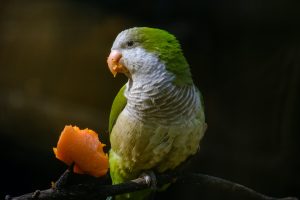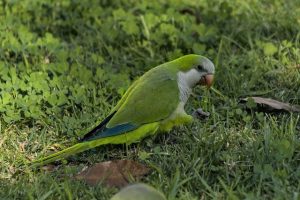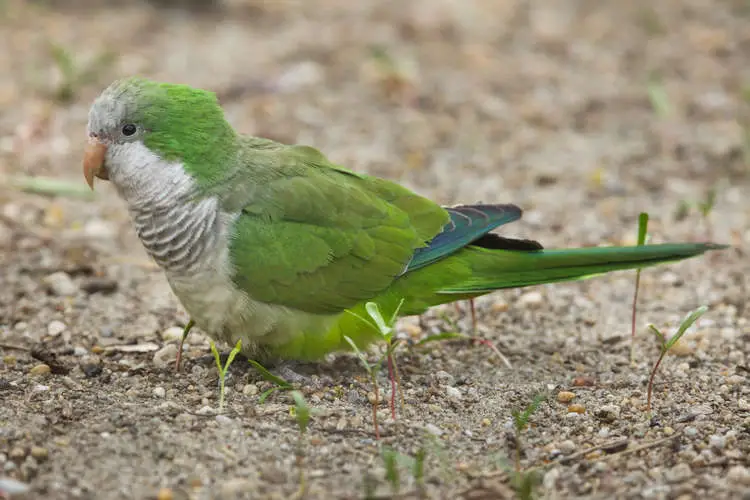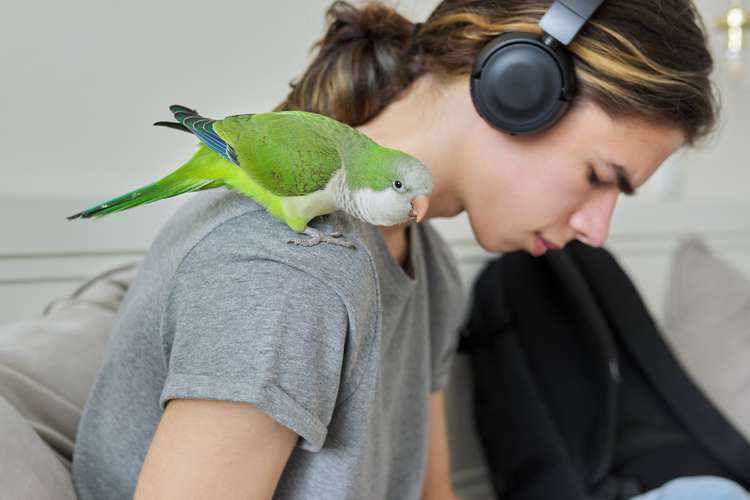Quaker parrots are beautiful and lively birds that are small in size. They mimic the sounds, words, and accents of people.
They exist naturally in green and gray colors. But other colors of these birds are now in existence through mutation.
They exist naturally in the wild, but they can also adapt well in the home when they are taken as pets.
Their small size, beauty, and lovely personality make people love having them around.
How Long Does a Quaker Parrot Live?

Generally, parrots live for a longer time and Quaker Parrots are no exception. The Quaker parrot also recognized as Monk Parakeet is a beautiful parrot that can be found in the wild.
This bird is commonly found in Argentina, South America, and surrounding areas. Its beautiful color attracts humans and they can be kept as pets in the home.
The lifespan of a Quaker parrot is subject to critical analysis. The number of years they live in the wild is different from the number of years they live in captivity. And we need to consider this.
On average, a Quaker parrot can live for about 20-30 years if it is well catered for. So, it is essential to protect and take good care of these birds.
Part of what shortens their lifespan is exposure to predators. And this is commonly associated with parrots that live in the wild.
In Details on Quaker Parrot Life Expectancy
01. Life Expectancy in Wild
Naturally, Quaker parrots are not domestic birds. Amazingly, they exist naturally in the forest despite their small size.
But they can equally do well if they live amidst humans. So, they can be taken as pets. They face a lot of difficulties living in the forest courtesy of their small size.
They are defenseless to predators and wild birds such as hawks and some other animals. And they can be eaten by these animals.
Even though they build nests and usually flock together, it is still not enough to protect them against predators.
They are often attacked when they go out in search of food and other needs.
While they are in the wild, they find it difficult to compete with other birds for food and other materials.
The life of these birds in the wild is filled with hassles, uncertainties, and death threats.
Therefore, the life expectancy is lower. The average life expectancy of a Quaker parrot in the wild is about 15 years.
They hardly live longer than 15 years in the forest. Many don’t live up to this date before they meet their doom. Generally, these parrots have a shorter lifespan in the forest.
02. Life Expectancy in Captivity
Having parrots around the home is a very interesting adventure for many people. They are fun, engaging, and easy to connect with.
Quaker parrots are no exception to this assertion. They are among the top parrots people enjoy having around.
They are beautiful, interactive, and clingy, among other fine attributes. Just looking at them can melt or spin your heart, let alone have them in your residence.
So, people take them away from the wild, which is their natural habitat to live in their homes. These parrots don’t like to be left alone for long.
So, you should consider this before keeping them around. Not giving them enough companionship could also shorten their life expectancy.
The interesting fact is that Quaker Parrots live lengthier in captivity. They live for about 20-30 years when they are captured.
That is if they are appropriately cared for. If you are keeping these parrots as pets, you have to make sure that they are fed the proper diet.
And also make sure that they are kept in the right environment. Doing this will improve their health and increase their life expectancy.
Poor diet and bad environmental conditions will make them die early.
Mutated Quaker Parrot Lifespan
Naturally, the dominant color of the Quaker parrot is green. However, different colors of these birds have been produced through color mutation.
Now you can find them in blue, white, lutino, aqua, fallow, turquoise, parable, and other colors of the bird. Some have two or more colors.
However, blue is the predominant mutated Quaker parrot. It is the most commonly seen next to green, which is their natural color.
Color mutation can be achieved through either dominant or recessive mutation. The recessive mutation is used to produce a more unusual and beautiful parrot.
People wonder if the color mutation of these birds has a resultant effect on their lifespan. The truth is that there is not even evidence to point out whether they do or they don’t.
Mutated parrots live a normal life. The average lifespan of parrots is between 15 and 25. However, some of them can live for more than estimated years if they are well maintained.
They are to be taken care of just like the other natural green bird. However, Mutated Quaker parrots are not available in the wild, so they don’t have their lives threatened by predators.
What is The Average Lifespan of a Quaker Parrot Compared To Other Parrots?
When compared to other parrots like Macaws, African grey, Caiques, Canaries, Cockatiels, Cockatoos, Conures, Lorries, Lovebirds, Parrotlets, and other Parrots.
parrots have a regular life expectancy, which means that they don’t have the highest lifespan, and they don’t have the lowest too.
The Amazons, Macaws, African grey, Caiques, cockatoos, and Senegals are among the oldest living parts in the world.
When adequately cared for, some of them can live on average up to 50-70 years. However, they don’t usually live this long in the wild.
But when they are captured and taken as pets, they live for a longer time. Especially when they are properly cared for.
The Canaries, Cockatiels, and Finches have a life expectancy that is shorter than 20 years. These parrots have the shortest lifespan among other parrots.
They also live in the wild. Many other parrots have a similar life expectancy to Quaker Parrot. They live for about 15-30 years.
Close monitoring of parrots’ diet and health is an important ingredient for an increased life expectancy.
Methods To Increase Lifespan of a Quaker Parrot

01. Feed Them The Right Diet
Even for humans, diet is a big aspect of healthy living. It is also the same for Quaker parrots.
Most of the difficulties people have with maintaining these birds revolve around diet.
It is important to feed them the right and adequate diet, which includes fruits, vegetables, seeds, nuts, and water.
Deficiency in one or more important nutrients can weaken the parrots’ immune system and eventually cause their death.
02. Correct Housing
Although the Quaker parrots are small in size, keeping them in a small cage may hinder some of their activities.
It makes them gloomy and stiff. They won’t be able to use their wings if they are kept in a small cage. Securing the cage with locks is crucial.
It prevents the birds from escaping and protects them from thieves. Also, ensure that the weather condition is suitable for the parrot.
03. Regular Medical Check-Up
Take note of changes in the parrots, even the ones that seem insignificant.
Notice the mood changes, eating habits, activeness, how they talk, and other signs of illness.
Quaker birds are susceptible to liver diseases, feather plucking, diarrhea, and some other diseases.
Understand the symptoms of these diseases and report any suspicion to a veterinary doctor.
04. Give Them Attention
Quaker parrots hate to be left alone for long hours. They need attention, companionship, and bonding.
They are accommodating, cheerful, interactive, and easy to communicate with. It is not wise to keep this parrot if you can’t give them a considerable part of your time.
Playing with them makes them happy and healthy and increases their lifespan in the long run.
05. Let Them Exercise
Quaker parrots should not be confined in the cage for the rest of their life. It is encouraged to let them out and exercise.
Wing flapping is one of the exercises that these parrots enjoy doing. It is also advantageous to their health. Moving about in the house is also an exercise.
Some Useful Tips About Quaker Parrot Care
Ensure The Cage is Clean
Birds are known for creating a mess. They can poop mindlessly in their cage and the house. So, the owner should always make sure to clean their cages.
And wipe out the mess they make. Make the cleaning a routine, and it is preferable to make it daily.
Take Harmful Objects Away
As an owner of a Quaker parrot, it is necessary to make sure that objects or materials that can harm these birds are kept away.
These harmful objects include toxic materials, blades, smoke, etc. Parrots are generally playful and adventurous, and their negligence may put them at risk if care is not taken.
Good Grooming
Establish a routine for bathing the parrot. However, don’t make it an everyday thing. Spray the birds sometimes just to remove dirt instead of bathing.
Also, if their nails get too long, it may be harmful to the birds and the people around them.
Therefore, it is essential to take the parrot to a veterinary doctor for nail trimming.
Train The Parrot
Training is a form of care for the bird. It makes it easy to have a happy relationship with them. Train them not to have a specific corner where they poop.
So that they won’t miss the house with their poops. Train them to bathe in a bowl, eat, and do every other thing that will make it easy for them to adapt.
Play With Them
Happiness is much related to the health of Quaker parrots. Communicate with them for at least one hour a day.
They hate to be bored. Persistent boredom may affect their health gravely. It can even lead to personality disorder, loneliness, and depression.
People Also Ask For
Are Quaker parrots good for beginners?
With their endearing personality and adaptable nature, Quaker parrots, also known as Monk parakeets, can make an excellent choice for beginners. Their social tendencies and moderate care requirements offer a welcoming entry point into the world of avian companionship, while their chatty charm and colorful presence bring joy to both newcomers and seasoned enthusiasts alike.
Do Quaker parrots like to eat?
Absolutely! Quaker parrots relish a diverse menu, ranging from high-quality pellets to fresh fruits, vegetables, and even the occasional treat. Their curious nature extends to their taste buds, making mealtime an enjoyable exploration of flavors that mirrors their vibrant personalities.
How To Determine a Baby Quaker Parrot Age?
It is inconceivable to know the exact age of a baby Quaker parrot. You can only make some assumptions based on their level of development.
The development of feathers and plumage. And some behaviors such as wing flapping and head bobbing will point out how developed a baby parrot is.
How Do You Know The Age of a Quaker Parrot?
You can’t figure out their age. You can only distinguish between the babies and the adult with their feathers, color, and other features.
But you can guess the age using certain parameters.
Why Do Quaker Parrots Live Longer in Captivity
It is a known fact that Quaker parrots live longer in captivity than in the wild, which is their natural habitat.
This is because they get better access to food in captivity, and they don’t have to compete with other animals as they do in the forest. They are also protected from predators.
How Long Can a Quaker Parrot Live Without Food?
Regular feeding is essential to parrots, Quaker parrots inclusive. And it is not wise to delay feeding them, this will expose the parrot to danger by weakening their immune system.
However, parrots can stay alive for at least 2 days without food. They may even stay for 3 or 4 days without food if they are very healthy.
How Long Does a Quaker Parrot Live?
On average, the Lifespan of a Quaker parrot is between 20 and 30 years. But they may not live up to this period, especially those living in the forest.
It is uncommon to find a Quaker parrot that is above 30 years. But it is possible.
Quaker Parrot Pictures

Final Say
In conclusion, a Quaker parrot can have a long life and can be kept in the home.
People who prefer long-term companionship with pets may go for this parrot instead of cats and dogs. But, you must be ready to adequately care for them.
Feeding them the proper diet, playing with them, and providing good medical care are some of the methods used to increase the life expectancy of Quaker parrots.
https://www.thesprucepets.com/quaker-parrots-390511

Hi, I’m Regina Rios. Just another bird lover who loves to share knowledge from personal experience. I’ve grown up with pet birds since childhood as my mommy also loves birds. As I can’t pet many birds in open air in my house as my mom does; I created my first bird cage on my rooftop using wood, copper wire, and a metal shed in 2018 and start collecting pet birds. Now, I have so many pet birds such as Macaws, Parrot, Cockatiel, Parakeet, and others. Not only that, if I see natural birds are injured I keep them in my house until they get well. Now, my hobby becomes my income source as my home birds have babies and I sell them to birds lover like mine. I’ve created this blog to inspire others bird owners by sharing my personal knowledge. Good Luck!


